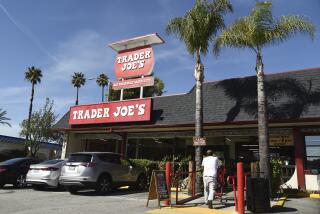Three Biggest Chains Put Their Stamp on Southland
- Share via
Southern California is emerging as a battleground among the nation’s three-largest quick-printing franchise chains, as Postal Instant Press, Kwik Kopy and Sir Speedy seek to recruit aggressive, well-financed store owners in the country’s second-largest market for printing.
PIP remains the leader with 225 stores in the area, but Sir Speedy, with about 85 stores, and Kwik Kopy, with 43, are expanding rapidly. All three began franchising their names in the late 1960s and are quite profitable. PIP had after-tax earnings of $3.5 million on revenue of $22.9 million for the fiscal year ending June 30. Kwik Kopy’s profit totaled $593,818 on revenue of $14.2 million for the year ended Feb. 28, while Sir Speedy’s 1986 profit came to $2.2 million on revenue of $15.5 million.
All three chains, which charge royalties equivalent to 4% to 8% of a store’s sales, say their success depends upon finding aggressive store owners who will market their operations heavily.
“Some franchise owners go around like Dobermans and some go around like bassett hounds,” said Frederick C. Hadfield, chairman of Kwik Kopy.
Franchise operators represent as much as 30% of all quick-printing centers and may command 45% to 50% of the market within five or six years, said Don F. Lowe, Sir Speedy’s president and chief executive.
But L. Thomas Carns, owner of an independent quick-printing store in Las Vegas and president of the 6,000-store, Chicago-based National Assn. of Quick Printers, disagreed. Franchises do better in the first year of operations because “they do have some hand holding,” he said, but in the long run, royalty payments place franchise owners at a competitive disadvantage.
Starting packages for new store owners are similar for the big three chains. They range in cost from $80,700 at Kwik Kopy, including a $36,000 franchise fee, to $92,000 with a $40,000 fee for PIP, and $92,500 with a $17,000 fee at Sir Speedy. Except for Sir Speedy, which charges $21,500 for market survey data, promotional materials and some supplies, the balance of the cost represents equipment, typically bought through the franchiser. Kwik Kopy and PIP both lend store owners part of their starting cost, including much of the franchise fee, but Sir Speedy does not.
Kwik Kopy has one advantage over both PIP and Sir Speedy: The closely held company has licensed its name to stores individually, rather than granting franchisees exclusive 20-year rights to geographical territories. PIP and Sir Speedy, which initially underestimated the industry’s growth potential, have bought back parts of territories. But both say they will renew large territory contracts as they begin expiring in the next several years. One of PIP’s territories, intended for a single store, now supports 10 stores.
There is, however, a limit to how densely even Kwik Kopy can grant franchises, Hadfield said. “You put in any more, and your franchise owners come break your windows.”
More to Read
Inside the business of entertainment
The Wide Shot brings you news, analysis and insights on everything from streaming wars to production — and what it all means for the future.
You may occasionally receive promotional content from the Los Angeles Times.









